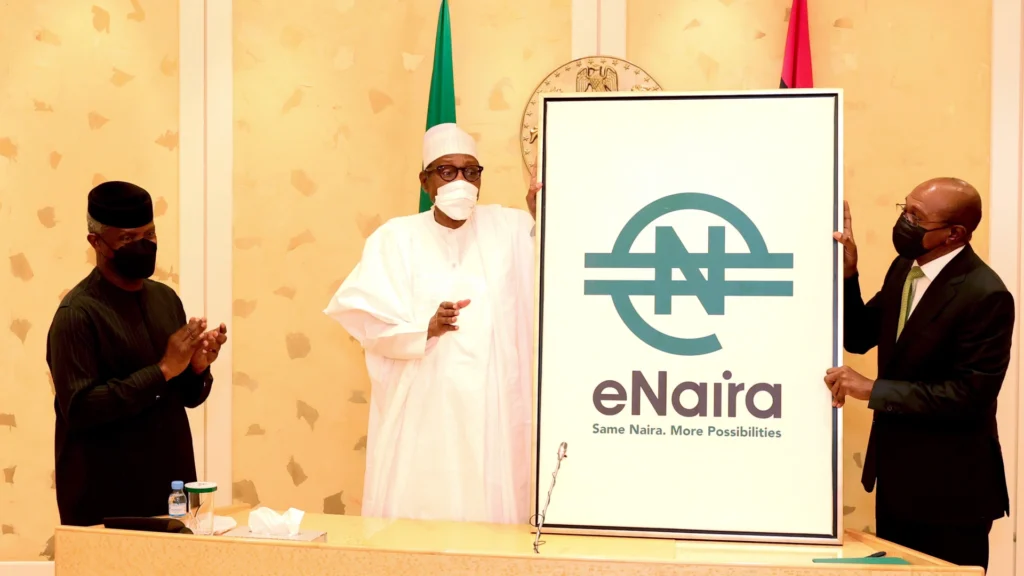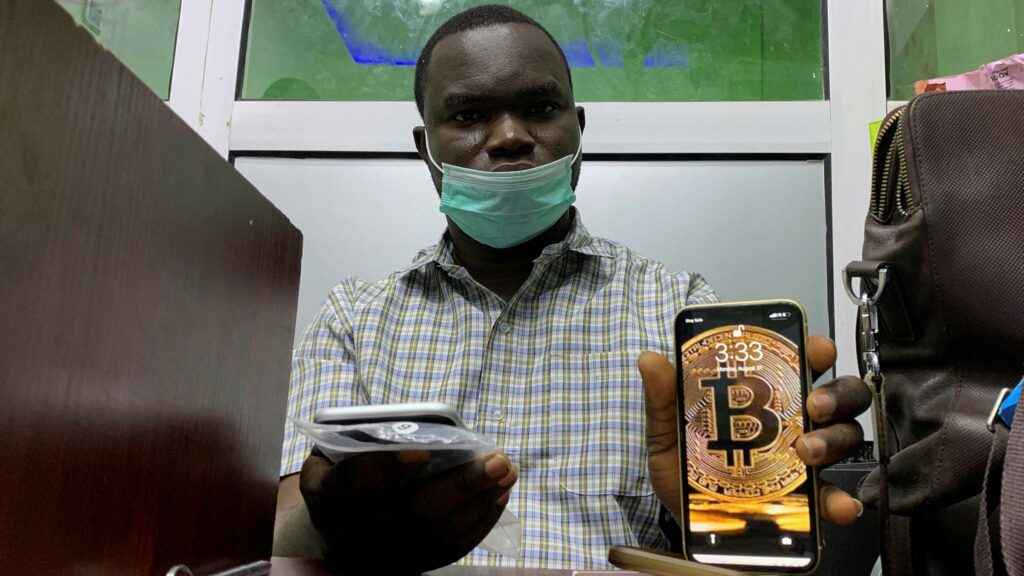- In 2021, Nigeria ranked amongst the top 10 crypto trading volumes globally.
- Nigeria’s peer-to-peer bitcoin trading volumes reached over $1.1 billion between January 2021 and June 2022.
- President Bola Tinubu’s manifesto suggests that the nation review existing Security Exchange Commission regulations on digital currency.
Nigeria’s blockchain space has significantly influenced the continent’s tech transformations within the last decade. With Nigeria starting to settle down with its new government, attention will be drawn to its development as Africa’s Crypto leader. President Bola Tinubu expressed great interest in the rapid crypto adoption in Nigeria during the presidential campaigns. Moreover, Nigeria is the first African country to launch its CBDC and stands tall in developing the crypto industry. President Tinubu promised additional plans to improve this idea.
The steady journey of crypto in Nigeria
Digital currency is revolutionary since its direct applications can transform the financial infrastructure. However, proponents of the traditional financial structure have remained rigid to the potential benefits. Thus, many within, including in Africa, have rejected the very notion of cryptocurrency.
Several governments have viewed the concept of digital assets as an attempt to undermine their already unstable fiat currency. Due to this fear, many countries, even Nigeria, banned the concept of cryptocurrency. On February 5th, the Central Bank of Nigeria ordered banks to engage in or enable any crypto-related activities.
Fortunately, this has not deterred individual crypto traders from adopting digital currency. Nigeria has one of the most significant trading volumes accounting for more than a third of the continent’s total. One of the key driving factors is the country’s unstable fiat currency.
Read: President Bola Tinubu Promises Nigeria’s economic revival.
The Naira remains among the most volatile currencies globally. In 2017, Naira’s value as against the dollar was $1 at N320, and nearly five years later, in 2022, the value rapidly shot to N707. The depreciation prompted many people to look for alternative stores, and soon, crypto emerged as a solution.
Nigeria’s Blockchain Ecosystem.
In 2021, Nigeria ranked amongst the top 10 crypto trading volumes globally. This milestone served as a wake-up call to its government, wasting no time taking advantage of this lucrative endeavour. Nigeria launched Africa’s first CBDC, the eNaira, within the same year. Since the establishment of the ENaira, the country has experienced rapid growth of blockchain-based organizations.
Moreover, the fintech industry has significantly grown in Nigeria. Home to 681 fintech startups, Nigeria has proven dominant in the digital currency ecosystem. The West African country is home to five of the best eleven African unicorn startups. Three of the five fall under the fintech category. Each is focused on improving financial inclusion. Flutterwave, OPay and Andela are the apex representation of Nigeria’s blockchain System.
According to Bictoin.com, Nigeria’s peer-to-peer bitcoin trading volumes reached over $1.1 billion between January 2021 and June 2022. Nigeria’s digital transformation is assured, with Africa’s most significant crypto trading volume and one of the best blockchain-based ecosystems. Furthermore, President Bola Tinubu has acknowledged the nation’s potential and plans to escalate crypto in Nigeria.

President Bla Tinubu advocates for crypto in Nigeria.
After his inauguration, President Bola Tinubu released a plan that, if enacted, would significantly build Nigeria’s crypto ecosystem. Tinubu’s plan addresses the critical ideas the nation has failed to implement. This has resulted in low CBDC adoption, causing plenty of controversies with the project.
Read: Nigeria 2023 election: Naira scarcity and the eNaira adoption may be interconnected.
Bola’s Manifesto on Crypto
One of the first points President Tinubu’s manifesto hinges on is the elaboration of clear and comprehensive regulatory frameworks. The manifesto suggests that the nation reviews existing Security Exchange Commission regulations on digital currency.
Given the high crypto usage in Nigeria, creating more business-friendly regulations would benefit all stakeholders. The new rules would also address and hopefully salvage it’s declining CBDC adoption rate. Furthermore, the manifesto stated that all digital asset companies would register with the SEC before operating within the country. This will also provide a legal framework that can easily handle the growing rate of fintech or crypto-related setups within the country.

President Bola Tinubu also emphasizes the need for crypto literacy within the country. The high crypto usage in Nigeria offers a practical example showcasing how digital currencies would eventually replace fiat currency. Additionally, the government intends to partner with several educational institutions, organize workshops and launch public awareness campaigns o educate on digital currency. The educational program would also expand Nigeria;’s blockchain ecosystem b educating innovators on new revolutionary technology.
Providing education and a legal framework will significantly aid the crypto adoption rate in Nigeria, but without steady infrastructure, it will be for nought. Bola Tinubu has stated that the new administration will heavily invest in building reliable and secure digital infrastructure.
Aside from aiding Nigeria’s blockchain ecosystem, it would also pave the way for other technological advancements to take root within the nation. The undertaking will include the development of faster Internet connectivity, expanding access to smartphones, and upgrading payment systems for crypto transactions.
Ensuring a smooth transition to digital currency will require heavy collaboration from traditional financial institutions. Initially, the concept of digital currency seeks to usurp conventional financial services. Fortunately, developers have found a way to ensure a smooth transition that would also accommodate traditional financial institutions.
Read: Africa is cryptocurrency-friendlier than you think.
To pave the way for the CBDC adoption rate, Bola Tinubu has stated that banking stems will require a significant upgrade. Implementing fintech features within sevral banking systems would provide a better solution for crypto in Nigeria and traditional banking systems.
President Bola has also expressed much interest in expanding Nigeria’s blockchain ecosystems. He claimed that the government would encourage blockchain innovation nationwide in his manifesto. They will provide the suport and incentives to nuture the country’s emrgin enterprises.
Bola has asserted that the government will provide grants and tax incentives and establish innovative hubs dedicated to blockchain technology. This initiative is unsurprising, given the country’s already rising blockchain ecosystem.
The future for Nigeria is blockchain.
Under President Bola Tinubu, Nigeria has an opportunity to lead Africa in a new technological era. If Bola implements a sustainable regulatory framework, promotes education and awareness, and develops robust supportive infrastructure, Nigeria might become Africa; tech Hub.
The country already houses several unicorn startups, and its future appears all too bright. Furthermore, aside from the high crypto rate in Nigeria, blockchain can also assist other industries. Its diverse functionalities allow developers to utilize blockchain in seniors, such as the medical industry, real estate, insurance and even agriculture.
Countries like Kenya and several parts of North Africa have already implemented real estate and insurance technology, providing its doable. If Nigeria stays true to its current trajectory, we might see the birth of a new technological powerhouse in Africa.
The rise of crypto inNiegri is but one aspect of the bigger picture. As it stands, Bola Tnubu is the man to accomplish this revolutionary feat.
Read: Nigeria elections 2023: Bola Tinubu targets blockchain, taxation and oil










